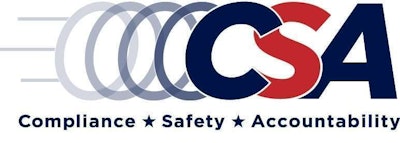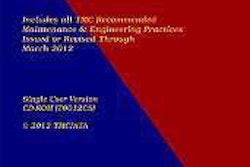
The Federal Motor Carrier Safety Administration late Friday, May 25, announced a 60-day extension of the time that motor carriers have to comment on proposed improvements to the agency’s proposed Safety Measurement System. The comment period now runs through July 30.
SMS is the workload prioritization tool that helps FMCSA identify motor carriers for safety intervention. During the extension, FMCSA will conduct further outreach to carriers to encourage them to review how proposed enhancements will affect their SMS score and take action to correct potential safety problems before the changes are implemented.
Carriers can access the SMS Preview through either the CSA Website or the FMCSA Portal using the “CSA Outreach” link. For more information about CSA, visit http://csa.fmcsa.dt.gov.
Updating CCJ Spring Symposium attendees on the latest Federal Motor Carrier Safety Administration rulemakings, FMCSA Administrator Anne Ferro on Tuesday, May 22, said the industry can be on the lookout for a Safety Fitness Determination proposal and perhaps a rulemaking in 2013.
SMS – which Ferro described as one of “the three core components” of FMCSA’s Compliance, Safety, Accountability program – replaced SafeStat to determine which fleets should be eyeballed for roadside inspections and to provide fleets with better visibility. Under the Safety Fitness Determination, FMCSA could use that data to replace the onsite inspection process.
Ferro said feedback regarding the CSA preview now available to fleets is critical. “That preview is under way because we want your input,” she told Symposium attendees. “Some in the industry are very concerned, and we need to know what those concerns are so that we can address them.”
Ferro estimated a current population of about 500,000 freight carriers and said that about 490,000 of those have no fatality numbers. “We have 200,000 carriers with sufficient data to analyze for all carriers, and 92 percent of all crashes are attributed to those carriers,” she said. “They represent 80 percent of the power units. Crash history is one of the stronger predictors of future crashes. How are we going to address crash accountability when it comes to addressing the (Behavior Analysis Safety Improvement Categories)?”
Ferro said the agency calls this process “crash weighting” – preventable vs. nonpreventable. “We started to answer that question through police reports, but those vary from state to state,” she said. “Over the course of the 90-day filing period, the content may change. So our challenge is if we have the final final report?”
Another element of CSA is how to make it a fair and open system, Ferro said. “If a company has a comment, how do we address that and other parties in the report, and if that process improves safety?” she said.
To make the system more fair for flatbed carriers, FMCSA recently moved Load Securement from the Cargo-Related BASIC to Vehicle Maintenance. “There was some concern that we were diluting the Load Securement category, but our accuracy went up 40 percent,” Ferro said.
The American Trucking Associations’ board of directors on Tuesday, May 22, called on FMCSA to make changes to CSA. “From the outset, ATA has supported FMCSA’s efforts to improve its enforcement capabilities through CSA,” said Bill Graves, ATA president and chief executive officer. “Through CSA’s development and implementation, the agency had been responsive to suggestions and made an effort to improve the program as needed. However, recently our members have become concerned that the agency has become increasingly unresponsive, even in the face of data and logic.”
ATA’s board and members said the unreliability of CSA scores; the loose or, at times, inverse connection to crash risk; as well as FMCSA’s unwillingness to frankly discuss the program’s weaknesses is troubling and needs to be addressed. Among the issues ATA has identified for reform are crash accountability, the lack of research proving increased crash risk for all of CSA’s various violation categories, and the publication of carriers’ scores in those categories.
“We are all concerned with safety and agree that FMCSA should do everything in its power to enforce the rules,” said Dan England, ATA chairman and chairman of C.R. England, based in Salt Lake City. “However, it is becoming increasingly clear that parts of the program are in need of serious revision, particularly before FMCSA begins using them to generate publicly available fitness scores.”












